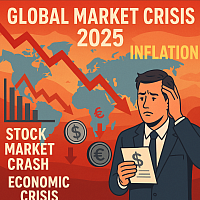💰 Economía y Finanzas
📰 Global Economic Crisis 2025: What It Means for Your Wallet
In 2025, the world is facing what economists describe as the most significant global economic crisis since 2008. With inflation soaring, stock markets plummeting, and central banks urgently seeking solutions, many individuals are left asking: How will this impact me?
This article delves into the root causes of the 2025 financial meltdown, examines its effects on individuals and businesses, and shares expert advice on safeguarding your financial future.
🌍 The Origins of the 2025 Crisis
The global economic crisis of 2025 did not emerge suddenly. Experts identify several key factors contributing to the turmoil: persistent inflation, volatile energy markets driven by prolonged geopolitical tensions—particularly in the Middle East and Eastern Europe—the tightening of monetary policies by the U.S. Federal Reserve, and a slowdown in China’s export-driven economy.
According to the World Economic Forum, over 47% of global economies are currently experiencing recession-like conditions, with consumer confidence at its lowest point in 15 years. Financial institutions have issued a "red alert" concerning global credit markets.
📉 Inflation in 2025: How Severe Is It?
Inflation rates worldwide have exceeded 8.5% in developed countries and reached over 13% in emerging economies. Prices for essential commodities such as food and fuel have surged by as much as 40% in some regions. In the U.S., gasoline prices are approaching record highs, with the average gallon costing $5.79.
“We're entering a phase where inflation is no longer transitory — it's systemic,” says Dr. Emily Langford, chief economist at Morgan Stern Capital.
💼 Job Markets Under Strain
The economic downturn has led to widespread layoffs across various industries. Technology companies have reduced their workforce by an average of 18% since January 2025. Manufacturing and retail sectors are also experiencing rapid job losses due to declining consumer demand and rising operational costs.
Small businesses are particularly at risk. A recent Deloitte report estimates that 32% of small and medium-sized enterprises (SMEs) worldwide could close by the fourth quarter of 2025 without substantial government support.
🔒 How Secure Are Your Bank Savings?
In light of banking instability, including the collapse of two major EU banks in the second quarter, many individuals are turning to digital assets and gold as alternatives. However, central banks caution against withdrawing all savings in a panic.
“Diversification is key. Avoid putting all your eggs in one basket — especially now,” advises Laura Méndez, financial strategist at the European Central Bank.
📊 Practical Steps You Can Take Now
- Cut Non-Essential Spending: Focus on necessities such as housing, food, and healthcare.
- Refinance Debts: With interest rates expected to rise further, securing lower rates now can save money.
- Invest Conservatively: Bonds and gold remain relatively safe investment options during economic uncertainty.
- Build Emergency Funds: Aim to save enough to cover 6 to 12 months of living expenses.
- Consider Developing Digital Skills: Many are transitioning to online-based careers, which can offer more stability (see → How to Earn Online in 2025).
🌐 Global Responses and Shifts in Power
In response to the crisis, the U.S. government has launched a $400 billion stimulus package focused on infrastructure and green energy initiatives. China is encouraging domestic consumption to counterbalance the decline in exports. The European Union is discussing new fiscal integration measures to stabilize the eurozone.
Meanwhile, BRICS+ countries are forming a new financial alliance aimed at reducing reliance on the U.S. dollar, signaling a potential shift in global economic power dynamics.
📎 Related Resources
- World Economic Forum – Global Risks Report 2025
- Reuters – Global Stock Market Update
- Elafsalsabila – Crypto Trends of 2025
🧠 Expert Predictions for the Coming Year
- IMF: Global GDP growth may fall below 1.2%.
- OPEC: Oil prices are expected to remain volatile amid reduced global demand.
- UN: Food insecurity could increase by 23%, particularly in conflict-affected regions.
🏁 Conclusion
The 2025 economic crisis represents more than just a financial event—it marks a fundamental shift in how economies operate and interact globally. As financial markets continue to evolve, individuals must adapt accordingly. Gaining a clear understanding of the causes behind inflation, recession, and market fluctuations is essential to navigating these challenging times.
This is not the end, but a wake-up call to prepare and respond wisely.


